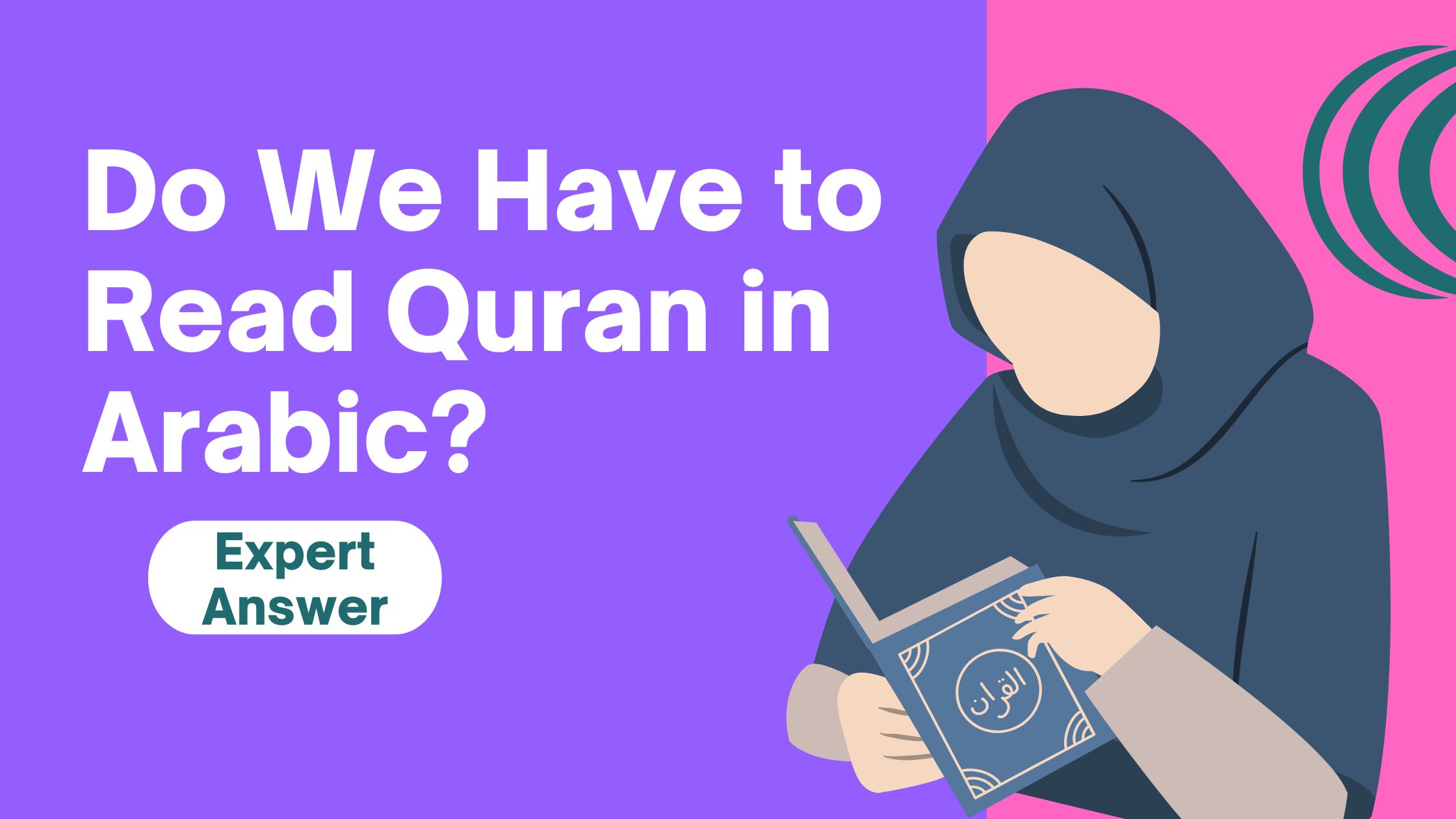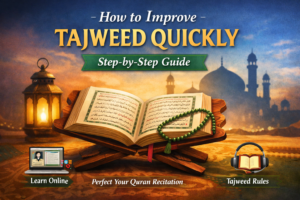Muslims must read the Quran in Arabic, as it was revealed in this language and contains the exact words pronounced by the Prophet Muhammad (peace be upon him). While translations of the Quran are available in various languages, they should be viewed as interpretations or explanations rather than the original Quranic text. The process of translation may lead to alterations or loss of meaning, emphasizing the necessity of reading the Quran in its original language for a complete understanding. However, for those who do not yet know Arabic, sincere intentions to learn the language and efforts to do so are commendable and rewarded in Islam.
For us Muslims, to read the Quran in Arabic is a cure to all distress that forces itself into our hearts, it’s the sun whose brightness chases away the frightened bits of darkness out of the corners of our hearts, allowing it to beat alive with light and purity.
Table of Contents
Do We Have to Read Quran in Arabic?
Reading the Quran in languages other than Arabic is not permissible according to the majority of scholars. The Quran was revealed in Arabic, and it must be recited in its original language to preserve its integrity and miraculous nature. Translating the Quran does not maintain its status as the Quran itself; instead, it becomes an explanation or interpretation of the Quranic text. Therefore, reciting the Quran in Arabic is essential for prayers and any other religious practices, as emphasized by various scholars, including Abu Hanifa, Shafi’i, Ibn Taymiyyah, and others.
While learning Arabic may be challenging, it is incumbent upon Muslims to make efforts to acquire at least a basic understanding of the language to fulfill their religious obligations properly. Those who are unable to learn Arabic due to legitimate reasons are exempted from this requirement, but they should strive to do so whenever possible. In the meantime, they may recite simple chapters of the Quran, such as Al-Fatiha, or short verses that they have memorized, during prayers.
Furthermore, reading translations of the Quran to understand its meanings is encouraged outside of prayer. Engaging in the study of Quranic interpretations and explanations enhances one’s knowledge and comprehension of the Quran’s message. However, it is crucial to distinguish between reading translations for comprehension and reciting the Quran itself, which must be done exclusively in Arabic.
Imam Nawawi stated in “Al-Majmu'”: Our school of thought is that it is not permissible to recite the Quran in any language other than Arabic, whether one is capable of Arabic or not, and whether it is during prayer or otherwise. If one recites a translation of the Quran in prayer instead of the Arabic recitation, his prayer is invalid regardless of whether the recitation is good or not. This is our school of thought, and it is also the opinion of the majority of scholars, including Malik, Ahmad, and Dawud. (Al-Majmu’, Islamic book, Reference: Al-Nawawi)
Imam Ibn Qudamah in “Al-Mughni” also stated: Reciting the Quran in a language other than Arabic or substituting its words with Arabic words, whether the recitation is good or not, is not acceptable. This opinion is also held by Shafi’i, Abu Yusuf, and Muhammad. (Al-Mughni, Islamic book, Reference: Ibn Qudamah)
Regarding the opinion attributed to Imam Abu Hanifa permitting the recitation of the Quran in Persian for those unable to understand Arabic, it is confirmed that he retracted from this opinion. According to Hanafi jurisprudence, it is prohibited to recite the Quran in any language other than Arabic. This retraction is documented in various sources, including “Al-Hidayah” and confirmed by the scholar Ibn Abidin. (Al-Hidayah, Islamic book, Reference: Ibn Abidin)
Ibn Taymiyyah mentioned: Translating the Quran is permissible for the sake of understanding without dispute among scholars. However, reciting it in translation for oneself is not permissible according to the consensus of scholars, neither in prayer nor outside of it. (Islamic book, Reference: Ibn Taymiyyah)
Al-Zarqani asserted: The consensus among scholars is that reciting the Quran in a language other than Arabic outside of prayer is not permissible. Those who do so are severely discouraged because reciting it in another language amounts to altering the Quran from its miraculous form to something that causes a deficiency in its miraculous nature. (Islamic book, Reference: Al-Zarqani)
Arabic is the language in which the Quran was revealed, and we are instructed to recite every word and every utterance in the exact way which was pronounced by our generous prophet, Mohamed (peace be upon him), and this would be realistically ensured and guarded by the grammatical and phonetic rules of the Arabic language.
Evidence For Reading Quran In Arabic Only:
There are many sources that prove we are allowed to read the Quran in Arabic only, including the Quran itself, in which Allah instructs us to do so. In Surah Yusuf, verses one and two can be translated as “Indeed, We have sent it down as an Arabic Quran so that you may understand”.
Our most noble prophet Mohamed (peace be upon him) highlighted the importance of reading the Quran in Arabic when saying: “Whoever recites a letter from Allah’s Book, then he receives the reward from it, and the reward of ten the like of it. I do not say that Alif Lam Mim is a letter, but Alif is a letter, Lam is a letter and Mim is a letter “. (Source)
As mentioned before, we are instructed to recite the holy book exactly as it was revealed, which means we are not allowed to change the pronunciation even for the sake of changing the language but rather to alter our own selves to fit the conditions of reading the Quran.
Reading Quran Translation:
Scientifically, it is proven that content might lose, gain, or be subjugated to alterations during the process of translation, which is one more reason we must not treat the translated version as the original Quran at all.
All attempts at translation are human-based; thus, must be lacking in some aspect, which might endanger believers with the threat of being misguided, or lead to cases of misunderstanding its most precious verses.
Read Translation As Tafseer Not The Exact Quran:
So, we are pretty comfortable saying that to read the Quran in Arabic is to “read the Quran”, but reading translations of the Quran is reading mere explanations of the Quran, that can never be elevated to the status of the Quran in its original language, Arabic. This makes it mandatory for Muslims to learn to read the Quran in Arabic.
What to do in case one doesn’t know Arabic yet?
Although for us -Muslim people- learning Arabic is inevitable, it can’t be helped to find oneself in a position where they don’t know anything about Arabic.
So, what should they do?
Stop reading the Quran? Never pray again? Or never do Dhikr again?
Of course not!
Remember that in Islam intentions are important, and hard work is always rewarded regardless of the results.
If you have the intention of learning Arabic in order to be able to taste the raw purity of the Quran yourself, and you attempt to learn it through taking such courses as the ones run by Bayan Al Quran Academy for example, you are on the right road!
Should I know all Arabic rulings before learning the Quran?
Learning Arabic rulings before learning the Quran is not needed at all, but as we mentioned above that you will need to learn the Noorani Qaida as it will help you along your learning by making you have better pronunciation and reciting for Quran.
Read the Quran Explanation while learning Arabic
While learning Arabic, you can read the Quran in whichever other language and pray in whichever other language -only until you master the arts of the Arabic language of course- and you will get rewarded for reading it in the other language such as English for sure, but perhaps not as much rewarded as when reading the Quran in Arabic.
It will definitely help you become more acquainted with the essence of the Quran and the core of Islam to listen to the Quran’s recitation in Arabic and read extensively on its meaning and explanations of the verses.
By the way, this is exactly what we are doing in this article; as we have provided translations and explanations of the meaning of the Quran verses to make sure we are understood by all; those who know Arabic, and those who don’t.
If we provided transliterations of the verses or presented them in their original Arabic language, they would not be easily understood by those who have not yet mastered the language.
So, we thought it most suitable to use translations and explanations of the verses until we are sure you can sail along with us in the sea of the Arabic language, and into the realm of the Quran.
The road towards reading the Quran in its original language; the Arabic language, might not be easy or simple, but it is certain that you are not alone on your journey. We are here right by you during every step of the way, looking at you with contentment and happiness, and praying for the day you feel your heart light up with its verses.
Learn Arabic For Quran:
All Muslim people ought to learn Fusha Arabic:
All of us Muslims ought to learn the Arabic language, or at least seriously attempt to learn it. The immense importance of the Quran in Islam dictates as much.
Besides being the main source of Shariaa, and the primary teacher of Islam, one of the main pillars of Islam, praying can’t be performed without reciting the Quran, which in turn must be recited in Arabic.
Therefore, it’s unavoidable for Muslim people to learn Arabic.
Bayan Al Quran Academy aims at helping you strengthen your faith, and prays to be a helpful hand in your lifelong journey with Islam; so, it has provided you with different online courses of Arabic language that are tailored to your needs, your level, and your circumstances.
🌟 Why Choose Bayan Al-Quran?
Join our vibrant community dedicated to perfecting Quranic recitation. Build a profound connection with the divine words of the Quran and enrich your spiritual journey. Choose Bayan Al-Quran for a transformative learning experience and embark on a path to mastering Tajweed with confidence.
You can also attend online Quran Classes with Bayan al-Quran with Native Arab tutors. There are also several courses that can help you in this regard:





















